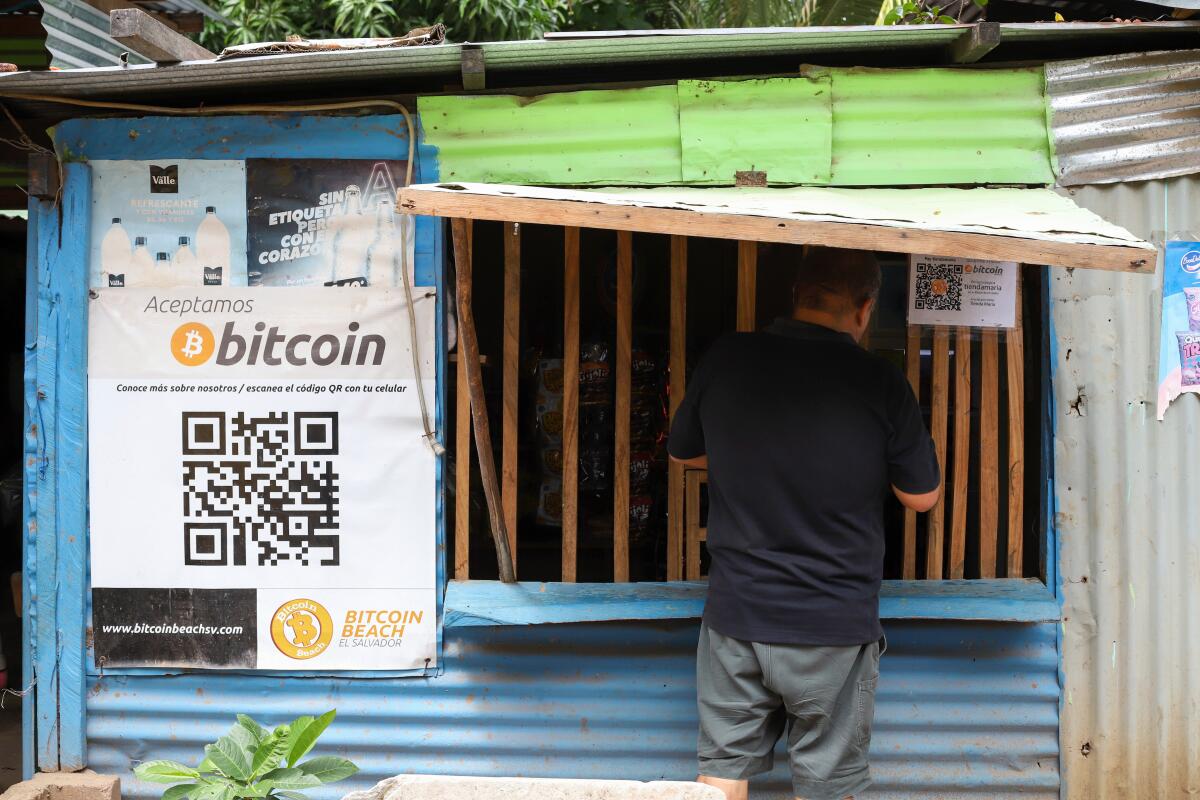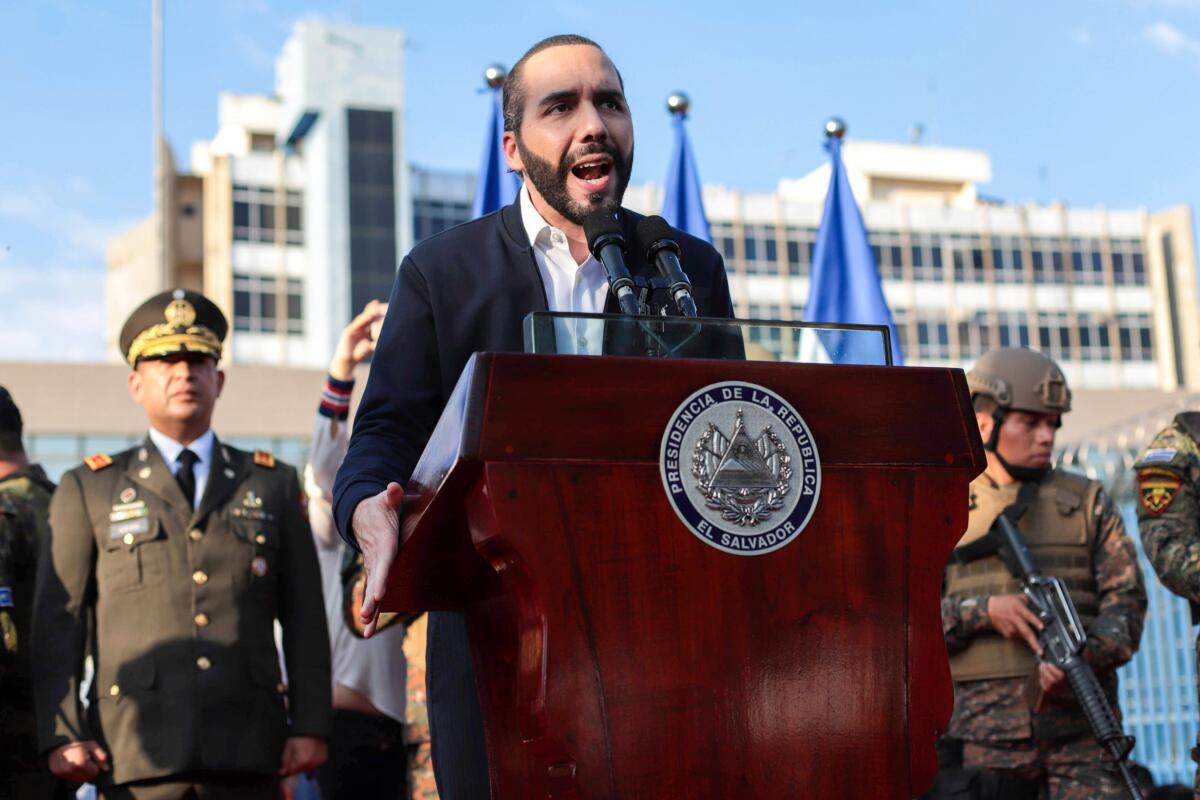El Salvador’s president buys bitcoins ‘naked,’ he boasts. His experiment is costing his nation millions

- Share via
SAN SALVADOR — Four months into El Salvador’s experiment as the first and only country in the world to adopt bitcoin as legal currency, the International Monetary Fund had seen enough.
Drop bitcoin now, its board of directors warned in January, saying the cryptocurrency poses “large risks” to the financial stability of the nation and its citizens.
President Nayib Bukele fired off a response via Twitter: an internet meme that compared the IMF to Homer Simpson.
Critics of the plan to make bitcoin legal tender in El Salvador say the cryptocurrency’s extreme volatility could bring devastation to one of the poorest countries in the hemisphere.
An authoritarian populist who brands himself the “CEO of El Salvador,” Bukele has become one of the world’s foremost bitcoin evangelists since pushing a law through Congress that requires businesses to accept the cryptocurrency for goods and services.
His grand plan has so far produced tepid results. El Salvador is believed to have lost as much as $22 million in reserves thanks to dramatic plunges in the cryptocurrency’s value.
Fraud targeting users of the country’s official bitcoin wallet, known as Chivo, has been widespread, with at least 1,000 people reporting that their identities were stolen through the app.
And despite Bukele’s promise that bitcoin would make life easier for the millions of Salvadorans who don’t have bank accounts as well as those sending remittances from abroad, few appear to be using it in their daily lives.
None of that has deterred Bukele, a former marketing executive known for his irreverent, internet-friendly antics. He keeps acquiring more bitcoins with the country’s cash, bragging on Twitter about “buying the dip” on his phone while “naked.”
Next month, in what experts say is its riskiest move yet, El Salvador will issue a first-of-its-kind $1-billion “bitcoin bond.”
Critics of the plan to make bitcoin legal tender in El Salvador say the cryptocurrency’s extreme volatility could bring devastation to one of the poorest countries in the hemisphere.
Half of the money raised from the bond offering will be used to build a tax-free “Bitcoin City” powered by an extinct volcano whose geothermal energy will be harnessed to mine new bitcoins, according to the government. The other $500 million will be used to purchase more bitcoins.
The 10-year bond offers investors an interest rate of 6.5%, which is much lower than the nation’s traditional bonds, which have been trading in junk territory because ratings agencies are so worried about Bukele’s bitcoin fixation. But it promises to pay investors dividends if the country’s bitcoin investment pays off.
Bukele insists the plan will help drive growth in a poor nation that has long struggled to ignite its economy. Experts are skeptical.
They have questioned whether people may buy in for the novelty without considering the country’s precarious financial situation.

Although El Salvador’s economy grew at a steep 10% in 2021, it remains in deep debt. The nation owes $1.2 billion in external debt payments next year, including an $800-million Eurobond repayment due in January.
El Salvador asked the IMF for a $1.3-billion loan to help cover those bills, but a deal looks unlikely given the nation’s refusal to drop bitcoin or make other financial adjustments.
“This is a government trying to find a silver bullet to try to cure all of its ills,” said Jaime Reusche, vice president at Moody’s sovereign risk group. “Typically those don’t work.”
On the off chance it does, Reusche said El Salvador will probably try to raise more money via bitcoin bonds while inspiring other developing countries to turn to cryptocurrency to circumvent traditional lenders.
“It could be a paradigm shift,” he said, noting that there is “a sense of general dissatisfaction with the IMF” among many poor countries because its loans are often contingent on nations implementing austerity measures.
The international financial community that is now sounding alarm bells applauded two decades ago when El Salvador gave up its currency and adopted the dollar. Dollarization has helped keep El Salvador’s inflation rates low compared with those of its neighbors, but it also means that the government has handed control of its monetary policy to the United States.
Bukele, who frequently complains that the U.S. is too involved in his nation’s affairs and who has cozied up to China, has embraced bitcoin as part of his larger plan to remake El Salvador.
He has shown increasingly authoritarian tendencies, sending soldiers to Congress to help push through a crime bill and purging the nation’s courts to pave the way for his reelection, even though the constitution bans it.
His government has been accused of using the Pegasus software to spy on journalists, human rights defenders and even members of his political party, Nuevas Ideas. Several of his aides have been blacklisted by the United States for allegedly paying El Salvador’s gangs to reduce homicides and provide electoral support.
This week, three U.S. senators introduced a bill asking the State Department to report on whether El Salvador’s adoption of bitcoin has opened the door for money laundering and whether the cryptocurrency poses risks to the U.S. financial system.
Bukele, as usual, reacted with a tweet: “OK boomers. ... We are not your colony.”
He announced that the country was moving to bitcoin at a June conference in Miami. Just a few days later, he presented a three-page law to Congress co-written by a 27-year-old American who owns a cryptocurrency company. It was approved by lawmakers in less time than a regulation soccer game and took effect in September.
Polls show a majority of Salvadorans distrust Bitcoin. Studies have shown that its fees for remittances are comparable with traditional money sending services, such as Western Union.
Jose Garcia, 52, who sells phone chargers on a crowded plaza in downtown San Salvador, said he sees no use for the cryptocurrency, which his pastor calls “the devil’s money.”
He said he downloaded the Chivo application when the government deposited $30 in every user’s account to try to spark adoption. He went to an ATM to convert it to dollars and never opened the app again.
“Most people took the $30 out and that’s it,” he said.
Byron Sandoval, a 32-year-old tattoo artist who works at a stand nearby, said he can see the potential of bitcoin and believes El Salvador may eventually profit from its early adoption of the digital money.
“In 10 to 15 years, the whole world will use it,” he said.
But in his personal life, he views bitcoin as too risky. He is paid mostly in cash, but when a customer wants to give him a digital payment using Chivo, he asks them to convert bitcoins into dollars first. Sandoval holds all his money on the app in dollars, because it doesn’t fluctuate.
“If they pay me in bitcoin, I can lose money,” he said.
Some locals question whom Bukele’s bitcoin revolution is really for. He seems intent on luring the global cryptocurrency community to his country, promising to fast-track residency to those who invest large amounts of money here.
Not that the Bitcoin plan hasn’t generated at least a few new jobs.
Last year, investigative journalist Nelson Rauda became the “Bitcoin correspondent” at El Faro, a news site that Bukele has repeatedly attacked.
Rauda’s reporting has raised a number of serious concerns about Bukele’s Bitcoin rollout.
The biggest ones revolve around the question of what it means for the nation when the president apparently has access to treasury funds on his smartphone.
Rauda’s inquiries into who runs the Chivo wallet have been hampered by the government, along with queries about the details of Bukele’s bitcoin purchases. The whole point of bitcoin transactions is that they aren’t transparent, he said.
“It seems like a super-smart way to hide what you’re really doing,” Rauda said. “I have a lot more questions than answers.”
More to Read
Sign up for Essential California
The most important California stories and recommendations in your inbox every morning.
You may occasionally receive promotional content from the Los Angeles Times.
















